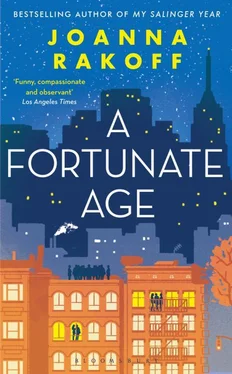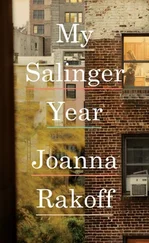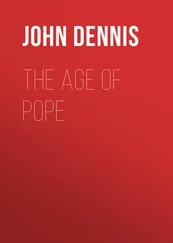One cool Monday in April, Emily arrived at the clinic alone—Josh had departed early for Eightieth Street to meet with a new patient. Siphoning herself a cup of coffee in the lobby’s small café, she nearly bumped into a dark-haired man, his cheeks rough with beard, who on closer inspection appeared to be Tuck Hayes. Tuck Roth -Hayes, Emily corrected herself. It had been—how long?—four months, perhaps, since she’d seen him and he looked worse for the wear. Increasingly, Lil had been appearing alone—when she had appeared at all, as she regularly canceled lunch dates—and speaking little of Tuck’s flaws and virtues, his ambitions and efforts (or lack thereof), the subjects that had consumed her in their first years of marriage. “My nagging him doesn’t do anything except make him annoyed with me,” she’d told Emily and Beth some months back. “I have to let him do what he wants to do, at his own pace.”
What Tuck wanted to do wasn’t exactly clear. In November, he’d finally turned in his book, just as things were getting really bad: magazines shutting down ( Lingua Franca , which was depressing; Talk , which was inevitable), dot-coms shouting bankruptcy, and all the pundits intoning doom, doom, doom for everything: the economy, the American two-party system, the air-travel industry. The age of irony, they were told, was over. Yet, no one wanted tragedy, because things were already tragic enough. And no one wanted comedy, real, straight comedy, because laughter—or at least the absence of tears—was an affront to the newly sober state of the nation. Readers, according to Sadie’s publisher, wanted books on Islam and terrorism and fundamentalism and the Middle East and globalization and germ warfare. They wanted books about America’s place in world culture, books that would explain why “they” all hate us so much and books about Afghanistan and Osama bin Laden and the oil industry and the intense corruption of the Bush family and the crimes allegedly perpetrated by Hillary Rodham Clinton, books by Times and Washington Post reporters, books by foreign correspondents who posed for their author photos in camouflage vests, against a backdrop of sand and blue, blue sky. They did not—at least, according to Val—want to part with thirty dollars to read about Internet impresarios and dot-com bazillionaires, and particularly not about Ed, who wasn’t exactly one or the other, who hadn’t invented anything or made a sick amount of money or, when you really thought about it, done much of anything, other than start a magazine. Boom Time had relaunched as planned, the previous June, and no one, really, had cared very much. Times had changed. A magazine was now just a magazine, not an instrument of cultural revolution. And Ed, well, no one cared about him either, according to Val, at least. Val, who was so nonplussed that Sadie had coupled with her subject—apparently it wasn’t such an uncommon occurrence—that she didn’t feel the need to mince words.
“Didn’t we cancel the contract on that one?” Val asked when Sadie called to tell her the manuscript had come in (hoping Val would conveniently forget how late Tuck had delivered). She was still out on maternity leave, of course, and Tuck had been instructed to send it to her old assistant, but Tuck, being Tuck, just gave it to Sadie at home. “I’m thinking we should write this one off, Sadie. That Amazon book bombed. The one by that fat guy. Remember?”
“I think,” Sadie responded, carefully measuring out her words, “you might want to read it first. The writing is great—” This had become her mantra with regard to Tuck’s book. “It’s not really a book about Ed. It’s more of a memoir. Sort of social satire. A commentary on the times. The dot-com bubble.”
“Does it need work?” Val had asked her. Sadie had admitted that it did—“just a little”—and Val instructed her to send Tuck edits; she’d read the revise. Her edits, however, did not strike Tuck as “little.”
“She doesn’t get what he’s trying to do,” Lil fumed to their friends. “It could take him another year to make these changes.”
“That’s absurd,” Sadie insisted coolly. “It’s a month’s work.” She and Lil were barely speaking. But then, Lil rarely—or never, actually—called Emily either, though she kept in touch with Caitlin Green, as did Tuck, apparently. Emily had run into the girl on Atlantic in March and been the recipient of a breathless monologue about her divorce (“Rob just didn’t understand me”), her move to Carroll Gardens (“It’s so warm here! Like Paris”), and the rather too intimate specifics of Lil’s marriage: Tuck, according to Caitlin, hadn’t started in on his rewrites yet—he was still smarting that Sadie hadn’t accepted the book wholesale—and was instead spending his afternoons at Belmont, under the tutelage of a local celebrity, the editor of a trust-fund-financed Williamsburg magazine, the sort with fashion spreads that looked like stills from seventies porn films. As a result, he’d lost sums of money equivalent to the next installment of his book advance, which he’d figured he’d have in hand by now. So they were back to square one, Lil and Tuck, living off Lil’s small salary. Even if Lil didn’t yet know it. God , thought Emily. I hate him . “Don’t say anything to Lil,” Caitlin told Emily. “I shouldn’t have said anything. I’m sort of his confidante.”
“Don’t worry,” Emily told her, more bitterly than she intended. “I haven’t even spoken to her in a month or two.”
It had been longer than that since she’d seen Tuck—since New Year’s Eve—and he’d lost weight, the flat hollows of his cheeks cast blue under the bright overheads of the hospital cafeteria. For a moment she contemplated pretending she hadn’t noticed him—turning on her heel and heading up to her office—but then he caught her eye and she forced a smile. “Tuck,” she said. “What are you doing here?”
“Emily Kaplan,” he said in his deep, rasping voice, running a hand over his face. “Boy, am I glad to see you.”
“What’s up?” asked Emily. Nothing good, she knew. “What are you doing here?”
“Lil’s here,” said Tuck, waving his hand toward the elevators. “Upstairs.”
“Oh my God,” said Emily. Upstairs meant the clinic. “Is she okay?” She thrust a few bills at the glowering cashier.
“Can we sit down? I’ve been up all night.”
“Um, sure.”
They carried their coffee to a small table by the terrarium, where Tuck took a long gulp, then shook his head from side to side, like a dog, his hair, which he’d let grow long, flopping around his ears.
“Lil had a miscarriage,” he said at last.
“Oh, no,” Emily cried. “Oh, Tuck.”
But he was looking away from her, up at the ceiling, then across the room, where a long-legged resident, Anne-Marie, was cleaning her glasses on the hem of her lab coat.
“Is she okay?”
“She’s fine. The bleeding got kind of scary, so the doctor said to bring her in. To the ER.” A shudder of relief skipped across Emily’s shoulders. She had been wrong. Lil wasn’t in the clinic. She was next door—“upstairs,” in the next building over—in the regular hospital, recovering from a normal physical ailment. “They did a D and C and she just kind of freaked out. She was just, like, crying —” He waved his hand in the air, unable or unwilling to explain what else Lil had done.
“It can be painful.”
“I guess.”
“How far along was she?” It couldn’t have been very far. Emily would have known. “They’re keeping her for tests? Or she lost too much blood?”
Tuck shook his head. “She wouldn’t stop crying. They brought in a psychiatrist. He said she seemed depressed and they decided to admit her—which took fucking all night.”
Читать дальше












